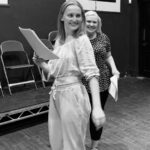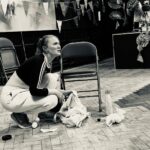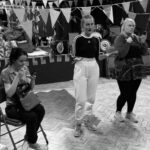The Space is thrilled to announce a new programme of events and play readings to support new writers and an online festival of duologues.
2.0 Fest will see 8 playwrights commissioned to create new duologues to be performed online. The duologues will be streamed live on 31st July and 1st August and recorded for future distribution throughout lockdown.
Locked Down, Looking Up will see 10 playwrights receive an online reading of their new plays, 6 directors develop and deliver 30 online workshops and 3 theatre companies perform online versions of shows that were due to perform at the Space.
The final strand of the programme is the newly created Space Theatre Club, like a book club but participants watch theatre online and then meet to discuss.
The Space will be hosting a special launch event on the evening of Thursday 21st May via zoom. Featuring details of the full programme, extracts of plays and interviews with many of the playwrights, directors and performers involved.
Since going into lockdown, the Space has been supporting theatre-makers and engaging audiences with online play readings and workshops. This emergency grant from the Arts Council has enabled them to expand their programme.
The commissioned 2.0 Fest playwrights are: Grace Chapman, Arthur Cole, Annie Fox, Francis Grin, Laura Horton, Gemma Lawrence, Kate Reid and Luke Stapleton.
The ScriptSpace playwrights and plays are: Natalie Baker (The Grinding Stone), Abigail Chandler (Adults), Katie Duncan (Refuge), Sam Essame (The Door), Emma Griffiths (Newbie), Katharine Jee (Book Club), Lekha Desai Morrison (Misfits), C.J. Scuffins (The Golden Dawn), Dan Shaw (Loose Lips) and Matt Wixey (A Huddle of Penguins).
Artistic Director, Adam Hemming says: “We’re delighted to receive this backing from the Arts Council. Our aim has been to promote positive mental health through engaging creatively with theatre online. The feedback we’ve had so far has been that what we’re doing is valued and important, so we’re excited to have the opportunity to deliver even more.
There is some amazing theatre available to watch online, but we missed being able to chat about them in the bar afterwards. The wonderful thing about the Theatre Club is that it brings together all of our stakeholders – audience members, participants and theatre-makers. We invite special guests from the productions to join us and have had the pleasure of talking to established names like Patsy Ferran, Nina Raine and Lizzie Clachan.”
Playwright Annie Fox said: “The Space has been exceptionally nimble in its response to the lockdown, supporting its artists and community in many ways. Like many writers, I had projects cancelled or postponed during this time, so am delighted to try my hand at a new type of play.”
Playwright Laura Horton said: “Like many people, just as I was about to hold readings for my first two full-length plays, they were cancelled. I truly thought a commission for an un-established writer would be out of the question for a long while, so to get my first during Lockdown has given me incredible energy and hope.”
Playwright Luke Stapleton said: “To be asked to write a new piece for 2.0 Fest is a real privilege, especially during such a hugely difficult time. The Space is a wonderful theatre which continues to source, nurture and commission new writers.”
The Space will launch Locked Down, Looking Up on the evening of Thursday 21st May at a special event on the zoom app. To book a place click here.
 ur fab actors re-familiarise with the script but also get stuck into the new bits.
ur fab actors re-familiarise with the script but also get stuck into the new bits. I pretty much only write comedy & am always looking for way to work with my director in crime, Coral (who also has comedic bones); we both want to make sure audiences have fun, escape & take a breather from reality in our pieces – fingers crossed we’ve achieved that with Hop!
I pretty much only write comedy & am always looking for way to work with my director in crime, Coral (who also has comedic bones); we both want to make sure audiences have fun, escape & take a breather from reality in our pieces – fingers crossed we’ve achieved that with Hop!